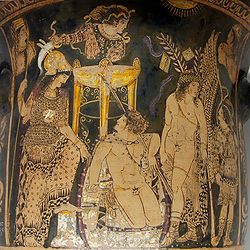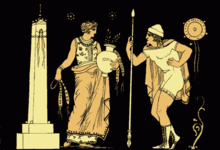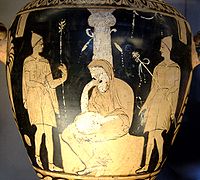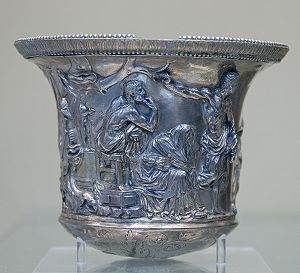- Orestes
-
For other uses, see Orestes (disambiguation).
 Orestes at Delphi flanked by Athena and Pylades among the Erinyes and priestesses of the oracle, perhaps including Pythia behind the tripod - Paestan red-figured bell-krater, c. 330 BC
Orestes at Delphi flanked by Athena and Pylades among the Erinyes and priestesses of the oracle, perhaps including Pythia behind the tripod - Paestan red-figured bell-krater, c. 330 BC
In Greek mythology, Orestes (English pronunciation: /ɒˈrɛstiːz/; Ancient Greek: Ὀρέστης [oˈrestɛːs]) was the son of Clytemnestra and Agamemnon. He is the subject of several Ancient Greek plays and of various myths connected with his madness and purification, which retain obscure threads of much older ones.[1]
Orestes has a root in ὄρος (óros), "mountain". The metaphoric meaning of the name is the person "who can conquer mountains".
Contents
Greek literature
Homer
In the Homeric story,[2] Orestes was a member of the doomed house of Atreus which is descended from Tantalus and Niobe. Orestes was absent from Mycenae when his father, Agamemnon, returned from the Trojan War with the Trojan princess Cassandra as his concubine, and thus not present for Agamemnon's murder by his wife, Clytemnestra, in retribution for his sacrifice of their daughter Iphigenia to obtain favorable winds during the Greek voyage to Troy. Seven years later, Orestes returned from Athens and with his sister Electra avenged his father's death by slaying his mother and her lover Aegisthus.
In the Odyssey, Orestes is held up as a favorable example to Telemachus, whose mother Penelope is plagued by suitors.
Pindar
According to Pindar, the young Orestes was saved by his nurse Arsinoe or his sister Electra, who conveyed him out of the country when Clytemnestra wished to kill him. In the familiar theme of the hero's early eclipse and exile, he escaped to Phanote on Mount Parnassus, where King Strophius took charge of him. In his twentieth year, he was urged by Electra to return home and avenge his father's death. He returned home along with his friend Pylades, Strophius's son.
Sophocles and Euripides
The same myth is told differently by Sophocles and Euripides in their Electra plays.[3]
Robert Graves
In The Greek Myths the mythographer and poet, Robert Graves, translates and interprets the legends and myth fragments about Clytemnestra, Agamemnon, and Orestes, as suggesting a ritual killing of a "king" (Agamemnon) in very early religious ceremonies that were suppressed when patriarchy replaced the matriarchies of very ancient Greece. Graves asserts that the sacrilege for which the Erinyes pursued Orestes was actually the killing of his mother, who represented matriarchy. He explains that worship of Athena was retained as a cult because it was too strong to be suppressed, but she was recast as a child of Zeus in new myths, even given the previously incomprehensible role of justifying what would have been a horrific crime against the old religious customs. Graves, and many other mythographers, were influenced by The Golden Bough of James Frazer, and since it was published many myths have been reinterpreted to reveal clues to ancient religious practices that were kept as secret rituals.

Greek drama
Aeschylus
The story of Orestes was the subject of the Oresteia of Aeschylus (Agamemnon, Choephori, Eumenides), of the Electra of Sophocles, and of the Electra, Iphigeneia in Tauris, Iphigenia at Aulis (in which he appears as an infant carried by Clytemnestra), and Orestes, of Euripides.
In Aeschylus's Eumenides, Orestes goes mad after the deed and is pursued by the Erinyes, whose duty it is to punish any violation of the ties of family piety. He takes refuge in the temple at Delphi; but, even though Apollo had ordered him to do the deed, he is powerless to protect Orestes from the consequences. At last Athena receives him on the acropolis of Athens and arranges a formal trial of the case before twelve judges, including herself. The Erinyes demand their victim; he pleads the orders of Apollo. Athena votes last announcing that she is for acquittal; then the votes are counted and the result is a tie, resulting in an acquittal according to the rules previously stipulated by Athena. The Erinyes are propitiated by a new ritual, in which they are worshipped as "Semnai Theai", "Venerable Ones", and Orestes dedicates an altar to Athena Areia.
Euripides
As Aeschylus tells it, the punishment ended there, but according to Euripides, in order to escape the persecutions of the Erinyes, Orestes was ordered by Apollo to go to Tauris, carry off the statue of Artemis which had fallen from heaven, and to bring it to Athens. He went to Tauris with Pylades, and the pair are at once imprisoned by the people, among whom the custom was to sacrifice all Greek strangers to Artemis. The priestess of Artemis, whose duty it was to perform the sacrifice, was Orestes' sister Iphigenia. She offered to release him if he would carry home a letter from her to Greece; he refused to go, but bids Pylades to take the letter while he stays to be slain. After a conflict of mutual affection, Pylades at last yielded, but the letter brought about the recognition of brother and sister, and all three escaped together, carrying with them the image of Artemis.
Other literature and media
After his return to Greece, Orestes took possession of his father's kingdom of Mycenae (killing Aegisthus' son, Alete) to which were added Argos and Laconia. He was said to have died of a snakebite in Arcadia. His body was conveyed to Sparta for burial (where he was the object of a cult) or, according to a Roman legend, to Aricia, when it was removed to Rome (Servius on Aeneid, ii. 116).
 Electra and Orestes, from Alfred Church, Stories from the Greek Tragedians, 1897
Electra and Orestes, from Alfred Church, Stories from the Greek Tragedians, 1897
Before the Trojan War, Orestes was to marry his cousin Hermione, daughter of Menelaus and Helen. Things soon changed after Orestes committed matricide: Menelaus then gave his daughter to Neoptolemus, son of Achilles and Deidamia. According to Euripides' play Andromache, Orestes slew Neoptolemus just outside a temple and took off with his cousin, Hermione. He seized Argos and Arcadia after their thrones had become vacant, becoming ruler of all the Peloponnesus. His son by Hermione, Tisamenus, became ruler after him but was eventually killed by the Heracleidae.
There is extant a Latin epic poem, consisting of about 1000 hexameters, called Orestes Tragoedia, which has been ascribed to Dracontius of Carthage.
Orestes appears also to be a dramatic prototype for all persons whose crime is mitigated by extenuating circumstances. These legends belong to an age when higher ideas of law and of social duty were being established; the implacable blood-feud of primitive society gives place to a fair trial, and in Athens, when the votes of the judges are evenly divided, mercy prevails.
In one version of the story of Telephus, Orestes was held captive by King Telephus, demanding that Achilles heal him.
According to some sources, Orestes fathered Penthilus by his half-sister, Erigone.
In The History by Herodotus, the Oracle of Delphi foretold that the Spartans could not defeat the Tegeans until they moved the bones of Orestes to Sparta. Lichas discovered the body, which measured 7 cubits long (around 10 feet, or 3.30 meters). Thus Orestes would have been a Giant.
For modern treatments see the Oresteia in the arts and popular culture.
References
- ^ Graves, Robert, The Greek Myths 112.1 ff.
- ^ Homer, Odyssey, book i.35ff.
- ^ See Electra (Sophocles) and Electra (Euripides)
 This article incorporates text from a publication now in the public domain: Chisholm, Hugh, ed (1911). Encyclopædia Britannica (11th ed.). Cambridge University Press.
This article incorporates text from a publication now in the public domain: Chisholm, Hugh, ed (1911). Encyclopædia Britannica (11th ed.). Cambridge University Press.Regnal titles Preceded by
CylarabesKing of Argos Succeeded by
TisamenusPreceded by
MenelausMythical Kings of Sparta
c.1200 BCSucceeded by
TisamenusKings of Laconia & Sparta Lelegids Lacedaemonids Atreids Pre-Spartan Heraclids Cadmid Theras (regent)Spartan Heraclids Agiad dynastyEurysthenes · Agis I · Echestratus · Labotas · Doryssus · Agesilaus I · Archelaus · Teleclus · Alcmenes · Polydorus · Eurycrates · Anaxander · Eurycratides · Leon · Anaxandridas II · Cleomenes I · Leonidas I · Pleistarchus · Pleistoanax · Pausanias · Agesipolis I · Cleombrotus I · Agesipolis II · Cleomenes II · Areus I · Acrotatus II · Areus II · Leonidas II · Cleomenes III · Agesipolis IIIEurypontid dynastyProcles · Soos · Eurypon · Prytanis · Polydectes · Eunomus · Charilaus · Nicander · Theopompus · Anaxandridas I · Zeuxidamus · Anaxidamus · Archidamus I · Agasicles · Ariston · Demaratus · Leotychidas · Archidamus II · Agis II · Agesilaus II · Archidamus III · Agis III · Eudamidas I · Archidamus IV · Eudamidas II · Agis IV · Eudamidas III · Archidamus V · Eucleidas · Lycurgus · Pelopstyrants/usurpers Spartan Heraclids LaconicusCategories:- Greek mythology
- Kings in Greek mythology
- Matricides
- Ancient Greeks accused of sacrilege
- Greek mythological hero cult
- Kings of Mycenae
- Kings of Argos
Wikimedia Foundation. 2010.





